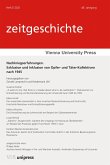Dieser Download kann aus rechtlichen Gründen nur mit Rechnungsadresse in A, B, BG, CY, CZ, D, DK, EW, E, FIN, F, GR, H, IRL, I, LT, L, LR, M, NL, PL, P, R, S, SLO, SK ausgeliefert werden.

Eine Geschichte der Märzunruhen 1968 in Polen aus jüdischer Perspektive
Während sich im März 1968 die Regierung in Prag mit den Demonstranten für die Freiheit vom sowjetischen Joch solidarisierte, herrschte in Warschau eine ganz andere Stimmung: Dort sprach Wladyslaw Gomulka, der Vorsitzende der moskautreuen Polnischen Vereinigten Arbeiterpartei von konterrevolutionären Kräften - und von der "Illoyalität" der Juden.
Auch in Polen demonstrierten damals Studenten gegen die Parteiführung. Sie waren nicht gegen den Sozialismus, sie waren gegen die Regierung, die diesen in ihren Augen verraten hatte. Die meisten Demonstranten waren jüdischer Herkunft - in einem Land, in dem zwei Jahrzehnte nach Ende des Zweiten Weltkriegs nur noch 30 000 Juden lebten und in dem der Antisemitismus wieder stärker wurde. Der Historiker David Kowalski hat jetzt mit seinem Buch dieses lange unbekannte Kapitel der polnischen Geschichte ans Licht gehoben. Das Buch ist in der Schriftenreihe des Leipziger Simon-Dubnow-Instituts erschienen.
Dass Kowalski sich dieses Themas annimmt und die Bedeutung der jüdischen Herkunft der jungen Oppositionellen in Polen untersucht, rührt von persönlichem Interesse her. Kowalski schreibt in der Einleitung, seine Eltern - Protagonisten der Protestbewegung in Polen - seien gegen Ende der sechziger Jahre wegen des immer stärker werdenden Antisemitismus im Lande nach Deutschland emigriert. Das Buch basiert auf zwanzig Zeitzeugengesprächen, im Mittelpunkt steht der berühmte Oppositionelle Adam Michnik, heute Chefredakteur der polnischen Tageszeitung "Gazeta Wyborcza". Kowalski erzählt die Geschichte sehr persönlich anhand der Erlebnisse der Protagonisten.
Der Autor schildert die Ereignisse nicht chronologisch, und so kommt er über Michniks Aussagen vor Gericht im Jahr 1969, die Proteste sind da längst niedergeschlagen, auf die Gründungsgeschichte des "Klubs der Widerspruchsuchenden". Mit dem habe alles begonnen: 1961 fanden sich Jugendliche in einem Diskussionsklub für Schüler zusammen, Kinder der Nomenklatura der polnischen Arbeiterpartei, Teil der Elite des sozialistischen Polens und meistens jüdischer Herkunft.
Verblüffend für den Leser: Der Klub entstand mit der Hilfe Adam Schaffs, der Mitglied des Zentralkomitees der Partei und Direktor des Instituts für Philosophie und Soziologie war. Es wurde zwar kurz darauf aufgelöst, weil sich die Mitglieder weigerten, die Zusammenkünfte unter Aufsicht des kommunistischen Jugendverbands weiterzuführen, aber der Geist der Widerspruchsuchenden lebte fort. An der Universität traf sich eine Gruppe um Michnik, die den polnischen Sozialismus kritisch betrachtete und bei Kulturveranstaltungen und Vorträgen für ihre scharfen Fragen gefürchtet war. Diese "Komandosi", Kommandotruppen, wie sie von der Geheimpolizei und der Presse genannt wurden, traten dann auch die Proteste 1968 los. Warum unter ihnen so überdurchschnittlich viele Menschen jüdischer Herkunft waren, sucht Kowalski zu ergründen. Sein Ziel ist es, die Lücke zwischen der Forschung zur Oppositionsbewegung und der zur jüdischen Geschichte in Polen zu schließen. Dies gelingt ihm mit einer ebenso einfühlsamen wie detaillierten Beschreibung des Selbstverständnisses der jungen Aktivisten, das zumindest unterbewusst von ihrer jüdischen Herkunft herrührte.
Die politische Auseinandersetzung der späten sechziger Jahre beruhte auf zwei unterschiedlichen nationalen Selbstverständnissen. Auf der einen Seite standen Michniks Anhänger. Sie knüpften das Polnischsein nicht an die Herkunft, sondern träumten von einer pluralistisch-demokratischen Gesellschaft. Für die andere Seite stand der Parteivorsitzende Gomulka, der die Polonität vor allem an ethnischer Zugehörigkeit und am katholischen Glauben festmachte. Schon 1967 hatte er zum ersten Mal seit dem Zweiten Weltkrieg wieder öffentlich zwischen Polen und Juden unterschieden. Er teilte die polnischen Juden in drei Gruppen ein: jüdische Nationalisten, die sich Israel verbunden fühlen, solche, die sich weder als Polen noch als Juden verstehen, und schließlich Juden, für die Polen das einzige Bezugsland ist. Nur die dritte Gruppe sei in der Partei hochgeschätzt, sagte Gomulka. Die oppositionellen Studenten erkannten die Gefahr - Antisemitismus in der allmächtigen Partei - und verteilten Flugblätter, die vor "Faschismus" warnten. Immer wieder wurde den nach den Märzunruhen 1968 festgenommenen Studenten jüdischer Herkunft ihr Polnischsein abgesprochen, bis einige begannen, selbst daran zu zweifeln.
Diejenigen, die 1968 in Warschau demonstrierten, definierten sich selbst nicht als Juden. Und doch, konstatiert Kowalski, sei das Protest-Umfeld "entscheidend durch den gemeinsamen jüdischen Erfahrungshintergrund geprägt" gewesen: wohlhabende Eltern, gehobene Bildung, ein sozialistischer Zukunftsoptimismus, der die Schrecken des Holocausts hinter sich lassen sollte. Kowalski resümiert: "Die hohe Beteiligung von Studenten jüdischer Herkunft an den Warschauer Protesten war Anzeichen eines letzten Aufbäumens der jüdischen Hoffnung in den Kommunismus." Die Niederschlagung der Proteste habe den letzten Glauben daran zerschlagen, dass mit der egalitären Weltanschauung des Kommunismus die "vollständige Assimilation an das Polnische" möglich werde.
SOFIA DREISBACH
David Kowalski: Polens letzte Juden. Herkunft und Dissidenz um 1968.
Vandenhoeck & Ruprecht, Göttingen 2018. 243 S., 45,- [Euro].
Alle Rechte vorbehalten. © F.A.Z. GmbH, Frankfurt am Main









